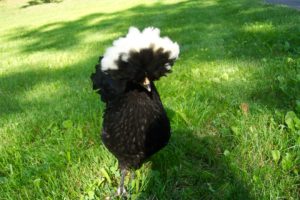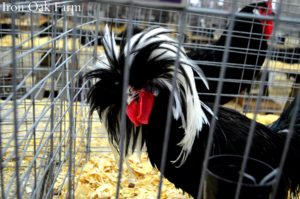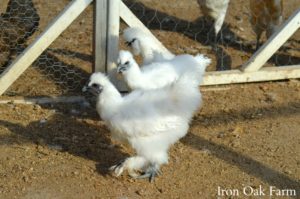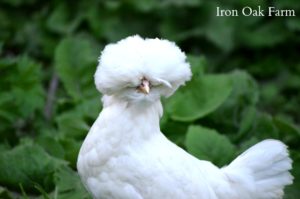
Over the years, I’ve raised Silkies on and off. Every once in a while, one of the feed stores will get in a batch and I just can’t say no. I think they’re absolutely adorable! As we expand our chicken coop, I’d like to designate a wing just to the Silkie breed.
Another breed I’d like to focus on is the white Crested Polish or Top Hat.
For me, interest always leads to research and research brought me to a Facebook group designated just for Silkie keepers.
 A topic that comes up quite a bit on this forum is wry neck. And while I’ve never experienced it first hand in my Silkies, I thought that it was worth some attention since it seems to be a common ailment, especially among Polish and Silkie breeds.
A topic that comes up quite a bit on this forum is wry neck. And while I’ve never experienced it first hand in my Silkies, I thought that it was worth some attention since it seems to be a common ailment, especially among Polish and Silkie breeds.
What is Wry Neck?
Wry neck, or torticollis, is a condition among poultry where the neck twists and or droops and can even hang on the ground. Eventually, the bird cannot eat or drink and it will starve or die of dehydration. Birds can also drown if they get their heads in the waterer.
 Wry neck can cause problems in most poultry species; chickens, ducks, turkeys, etc. But is especially common in the Silkie and Polish breeds.
Wry neck can cause problems in most poultry species; chickens, ducks, turkeys, etc. But is especially common in the Silkie and Polish breeds.
What Causes Wry Neck?
Wry neck can be caused by 3 things:
- Genetics
- Vitamin deficiency
- Head trauma
Treating Wry Neck
If the wry neck is a genetic problem, those birds should be removed from your breeding program as to not pass it down to future generations.
 If it is caused by head trauma then there’s not much that can be done. Depending on the situation and the severity, it may be humane to put the bird down. It is thought that Silkies and Polish are more prone to brain injuries because of their domed skull shape.
If it is caused by head trauma then there’s not much that can be done. Depending on the situation and the severity, it may be humane to put the bird down. It is thought that Silkies and Polish are more prone to brain injuries because of their domed skull shape.
To rule out the above two causes, supplements can be used to reverse the symptoms. The main two vitamins that are used to treat wry neck are vitamin E and selenium.
 I find this interesting because we also raise goats, and when baby goats are born selenium-deficient, their hooves will curl under and their backs will arch. We see this with our goat kids every once in a while and after a dose of supplements they straighten out within a day or 2.
I find this interesting because we also raise goats, and when baby goats are born selenium-deficient, their hooves will curl under and their backs will arch. We see this with our goat kids every once in a while and after a dose of supplements they straighten out within a day or 2.
There are a few supplements on the market made specifically for chickens, but you can also use plain old vitamin capsules meant for humans with great success. Selenium tablets can be crushed and added to feed, and vitamin E tablets can be pierced and the oil squeezed over food.
Vitamins can also be given by dietary additions:
- Brazil nuts are high in selenium and can be ground and given to chickens
- Sunflower seeds, especially black oiler, are high in vitamin E
Other important vitamins are vitamin B and vitamin D. If your chickens are experiencing Wry Neck, make sure they are exposed to sunlight.

Some cautions:
- Catching wry neck in the early stages is important for a full recovery
- Wry neck can come on overnight, so if you have one of the breeds that’s more prone, be sure to check your flock often.
- All chicken breeds at all ages can develop wry neck, not just Silkies and Polish, and not just young chickens.
- Too much selenium can be toxic, so research the dosage for the size and weight of your chicken.
- Stress can cause wry neck to become worse. Separate affected chickens from the rest of the flock to avoid pecking. Hand feeding and watering may be needed until the neck corrects itself.













1 Comment
Great job.